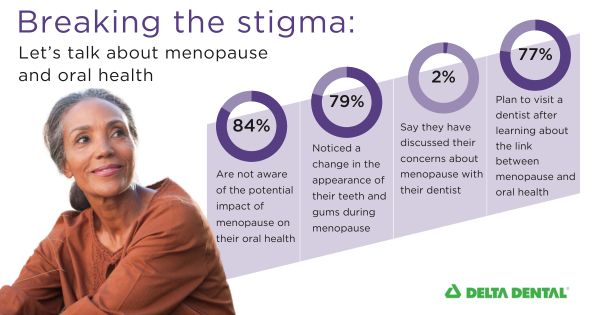Unlocking menopause’s hidden impact: 84% of women 50 and older unaware of menopause-oral health connection
Delta Dental’s first Senior Oral Health and Menopause Survey revealed that 70% of women 50 and older experience oral health symptoms they don’t realize relate to menopause, making dentists a prime, untapped resource for women navigating it.

SAN FRANCISCO, CA – An astounding 84% of women aged 50 and over are unaware that some of the oral health symptoms and discomfort they experience could be related to menopause, according to Delta Dental’s 2023 Senior Oral Health and Menopause Report: Breaking the Stigma.
The survey also revealed that most women who are experiencing menopause are unaware of how dental providers can help them address symptoms related to menopause and recommend treatments. Though 70% of women 50 and older indicated they have experienced at least one oral health symptom since beginning menopausal symptoms, only 2% have discussed their concerns with their dentist and only 1% with their dental hygienist.
“With menopause a long-stigmatized topic and symptoms going largely unaddressed or even ignored, these findings are stark but unsurprising,” says Sarah Chavarria, President at Delta Dental. “Despite the knowledge gaps revealed in this survey, sentiments about menopause are beginning to shift, and women are eager to break the stigma. At Delta Dental, we are committed to empowering more whole-person care that incorporates oral health into overall physician care and wellbeing, including in menopause. Being more open will help make treatment plans more accessible for all people who experience menopause.”
The missed connections between menopause and oral health
Of the over 1,000 women surveyed, 70% who have begun experiencing menopausal symptoms say they have noticed at least one of the following oral health symptoms: dry mouth (39%), receding gumlines (30%), tooth sensitivity or pain (28%), tooth decay (20%), bleeding gums (16%), altered taste (13%), reduced saliva production (13%) or burning tongue (5%).
Despite experiencing these common symptoms, most women didn’t associate them with hormone shifts. While 39% said they experienced dry mouth, 77% were not aware dry mouth can be related to menopause. Lack of awareness was even higher among other symptoms:
- Reduced saliva production (90% unaware of association with menopause)
- Increased tooth decay (88%)
- Increased risk of gum disease (87%)
- Jawbone density (87%)
- Tooth loss (85%)
- Receding gum lines (83%)
The survey also revealed that despite these gaps, nearly half of women 50 and older indicated they are extremely or moderately curious to learn more about how menopause and hormonal changes affect oral health as they age. In a promising sign, after learning about the connection between menopause and oral health care, respondents indicated they were moved to make changes in their life to help improve their oral health:
- 77% of women 50 and older say they will prioritize scheduling their next dental exam/cleaning.
- More than 2 in 5 women 50 and older (43%) say they will spend much more time on their oral health care routine.
Patient education opportunities for dentists and dental staff
The survey findings made evident that dentists and dental hygienists are a prime, untapped resource for women navigating menopause. When it comes to where women aged 50 and older go to learn more about menopause and their symptoms:
- More than 4 in 5 (84%) say there should be more resources that provide information about the link between menopause and overall health.
- Nearly 2 in 5 (39%) say healthcare providers can do more to encourage women to ask questions about menopause.
- Only 1 in 4 (26%) look to their primary care provider for information on menopause-related oral health concerns – the same percentage that look to Google.
For dentists, Dr. Daniel Croley, Chief Dental Officer at Delta Dental, recommends checking in with patients who are approaching or in menopause. “As medical professionals, we have a responsibility to ensure our patients are receiving the holistic health care and support they deserve – not only oral health, but whole person health as well,” he says. “We can help ease the burden and break the stigma by creating space for these conversations.”
Delta Dental is committed to providing older adults with consistent, quality access to oral health care, improving education and driving lasting policy changes to address systemic issues. To learn more about the survey, view Delta Dental’s full report.
Delta Dental 2023 Oral Health and Menopause Survey Methodology:
Delta Dental commissioned Atomik Research, an independent market research agency, to survey American women aged 50 and older about their awareness of the impact menopause has on their oral health, and related actions. The national sample size of 1,061 American women 50 years of age or older was representative of the race/ethnicity composition of the senior population across the United States. The margin of error is +/- 3 percentage points with a confidence level of 95 percent. Fieldwork took place between July 24 and July 31, 2023. Analysis was supported by Atomik Research and The Bliss Group.